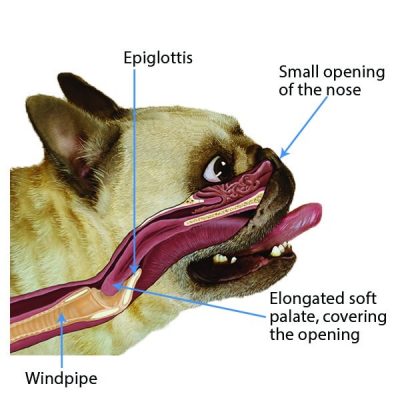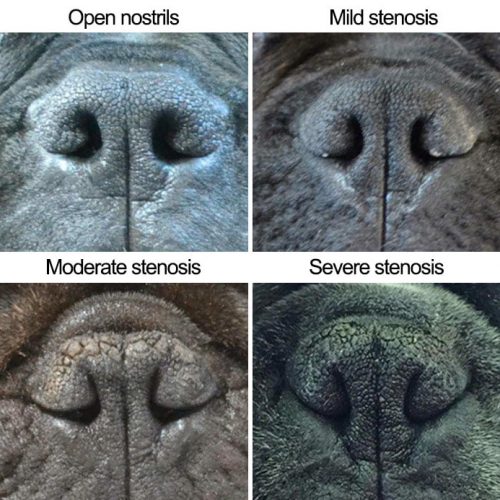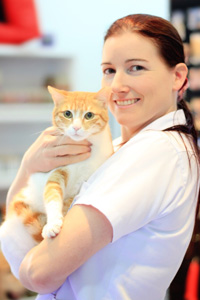Do you have a bulldog or a pug? Are they snoring a lot? Does it bother you?
Probably not, as you are used to it. But have you ever thought about if it bothers your dog? For sure, he is not saying anything to complain (because he can’t), and in a way, he is also ‘used to it’, as it is part of the breed related problem that we refer to as brachycephalic airway syndrome and he was born with it.
However, with age, this problem tends to get worse and yes, from the medical side, all points towards it being a problem for the patient.
So what is happening?
At the back of the mouth, where the throat starts, there is a crossover of the airways (nose / nasal cavity into the windpipe) and food ways (mouth into esophagus). This crossover section is guarded by two structures, the epiglottis and the soft palate. They make sure that food goes into the esophagus and air goes into the windpipe and not the other way around, functioning as mildly overlapping valves at the intersection.

In brachycephalic (short nosed) breeds, the soft palate tends to be elongated, so that it partially covers the entrance to the windpipe at all time, not just when swallowing something. This soft tissue fold vibrates when the dog draws in breaths, as it is right in the airflow. This vibration is audible as the typical breed related snore. It tends to get worse when the dog is excited or running, as anything that will increase the need for oxygen and thus increase the depth and frequency of breathing, will also result in more vibrations of this part. And, as if this wasn’t bad enough to start with, it tends to get worse with age. Why? Because the constant effort to draw in breath against this partial obstruction creates a lot of negative pressure, which ‘pulls’ on the tissue, causing inflammation, swelling, and – over time – permanent thickening of the soft palate. This, in turn, further restricts the airways and the vicious cycle is complete.

If we add to this small nostrils (openings of the nose), which increases the need for deeper breath and more negative pressure to draw in air, the problem gets aggravated even more.
What do you see at home – apart from the snoring noise? Signs of discomfort, restlessness, difficulty settling down, not being able to sleep unless the head is rested up, pumping lines on the abdomen when the dog is trying to breathe, and – worst case – your puppy’s tongue is turning blue whenever he gets too excited or when he is exposed to summer temperatures, even if you avoid the heat by walking early morning or late evening. Those are actually alarming signs and indicating a severe lack of oxygen!
What can be done?
Apart from keeping him extremely slim and keeping him cool to avoid overheating, there is a surgery to shorten the soft palate and open the nares (nose openings). This allows for better air flow with less resistance. If you have any questions regarding the procedure, please contact the clinic for more details.

Veterinary Surgeon

Be the first to know about exciting promotions, special discounts, and essential updates.
This website uses cookies to ensure you get the best experience on our website.